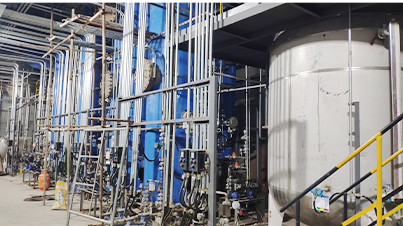Effective Strategies for Preventing Scale Formation in Water Systems
Water Scale Inhibitors A Key Solution for Sustainable Water Management
Water is an essential resource, and its availability directly impacts everyday life and economic activities. However, the quality of water is often compromised by various factors, including the formation of scale in pipes, boilers, and cooling systems. Scale formation primarily occurs due to the precipitation of minerals, such as calcium and magnesium, and can lead to significant operational inefficiencies, increased energy costs, and potential system failures. To combat this issue, water scale inhibitors play a critical role in maintaining water quality and ensuring sustainable water management.
Water scale inhibitors are chemical compounds designed to prevent the formation of scale in water systems. They achieve this by disrupting the crystallization process of minerals, allowing them to remain soluble in water rather than precipitating out and forming deposits. A variety of inhibitors exist, including phosphonates, polyacrylates, and certain organic acids. Each type has its unique properties and applications, making it crucial for industries to choose the right inhibitor based on the specific conditions of their water systems.
The effectiveness of water scale inhibitors largely depends on factors such as temperature, pH, and the concentration of the minerals present. For instance, in high-temperature environments like boilers, certain inhibitors are more effective at preventing scale formation than others. Furthermore, the choice of an inhibitor must consider the composition of the water, including the types and concentrations of dissolved salts, to ensure optimal performance. As a result, extensive testing and monitoring are often necessary to implement an effective water scale management strategy.
water scale inhibitor

The benefits of using water scale inhibitors extend beyond mere scale prevention. By maintaining clean and efficient water systems, industries can significantly reduce their maintenance costs and downtime. Scale buildup can lead to increased energy consumption as equipment works harder to counteract the effects of reduced efficiency. By preventing scale formation, water scale inhibitors contribute to energy savings and lower operational costs, ultimately benefiting both the environment and businesses' bottom lines.
In addition to their economic advantages, water scale inhibitors can also support environmental sustainability. With increasing global awareness of water scarcity and pollution, industries are under pressure to adopt greener practices. Effective scale management helps minimize water waste and reduces the need for chemical cleaning agents, which can be harmful to aquatic ecosystems. Furthermore, by optimizing water use and energy efficiency, companies can lower their carbon footprint, aligning with global sustainability goals.
In the context of growing concerns over water resources and climate change, the use of water scale inhibitors is becoming increasingly important. As industries seek to balance profitability with environmental responsibility, the implementation of these inhibitors offers a viable solution to combat scale-related issues while promoting sustainable practices.
In conclusion, water scale inhibitors are essential tools in the arsenal of water management strategies. They not only prevent scale formation but also enhance operational efficiency, reduce costs, and support environmental sustainability. As we continue to navigate the challenges posed by water scarcity and infrastructure maintenance, investing in effective scale management solutions will be crucial for ensuring a resilient and sustainable future for our water systems.
-
Dodecyldimethylbenzylammonium Chloride: High-Purity DisinfectantNewsAug.30,2025
-
2-Phosphonobutane-1,2,4-Tricarboxylic Acid: Scale & CorrosionNewsAug.29,2025
-
Premium Isothiazolinones | Broad-Spectrum Biocidal SolutionsNewsAug.28,2025
-
LK-319 Special Scale And Corrosion Inhibitor For Steel Plants: Advanced Solutions for Industrial Water SystemsNewsAug.22,2025
-
Flocculant Water Treatment: Essential Chemical Solutions for Purification ProcessesNewsAug.22,2025
-
Isothiazolinones: Versatile Microbial Control Agents for Industrial and Consumer ApplicationsNewsAug.22,2025





